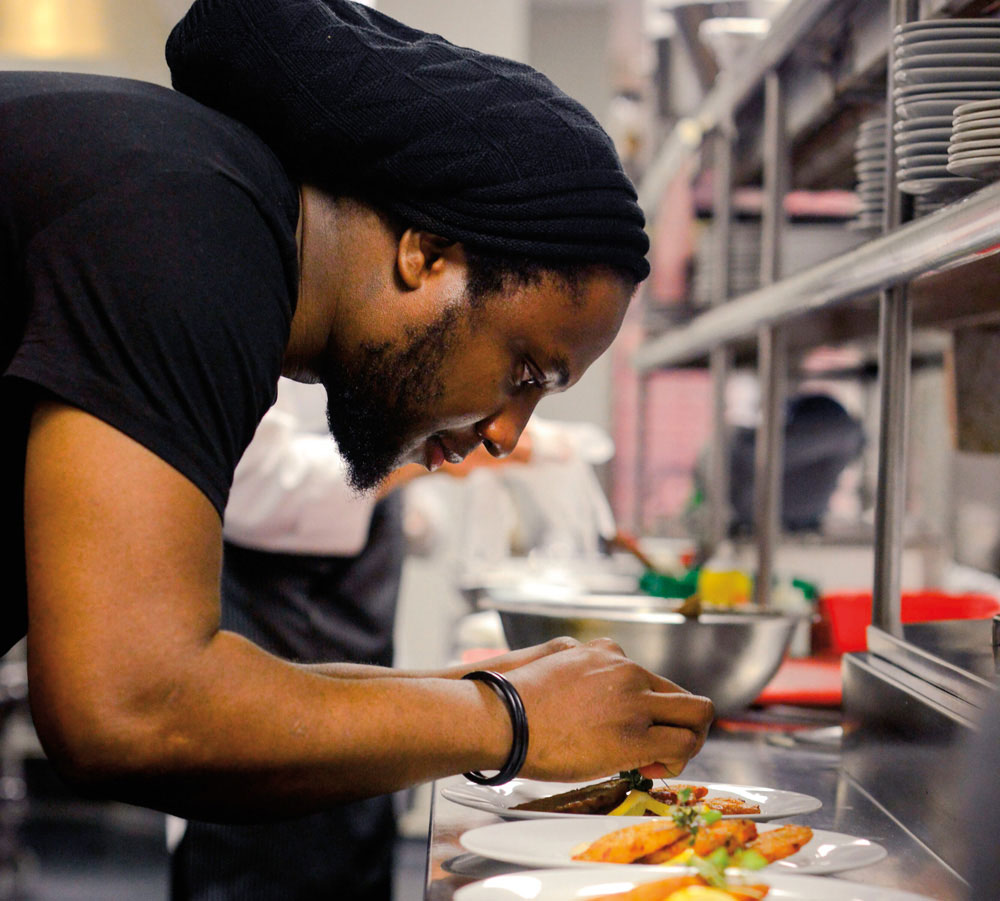If you’ve been lucky enough to work somewhere with colleagues from across the globe, the one time of the year you really look forward to is Christmas. It’s the time when everyone brings a traditional dish from their country for the office potluck.
Imagine having a buffet laden with delights like panettone from Italy, latkes from Israel, tamales from Costa Rica, Sachertorte from Austria, stollen from Germany, jamón ibérico from Spain, and mince pies from the UK — with, of course, some ponche de creme and sorrel from the Caribbean.
One place this really does happen is at the United Nations headquarters in New York City, where chefs from around the world are invited to share their national Christmas delicacies. In December 2018, for the first time, chefs from the Caribbean were invited to show off their wares, as part of the Caribbean Holiday Guest Chef Series. This is an initiative by Jamaican-American lifestyle blogger Nneka Nurse, in collaboration with the United Nations Delegates Dining Room.
“This came about with an idea I had to showcase Caribbean holiday cultures here in the US,” Nurse says. “This had never been done before, and I felt there was a cultural void among the younger Caribbean-American community.”
Nurse says she was lucky that, by spending holidays in the Caribbean as a child, she had the opportunity to engage with and fully understand her Jamaican heritage — but it’s not the same for many Caribbean-American chefs in the US. “Spending time there help me recognise the beauty of Caribbean culture . . . as well as a sense of pride. The holidays are a time of celebration and eating. Not gift-giving. While all of the holiday traditions could not be shared, I figured the easiest element to introduce would be food,” she explains.
I first encountered Nurse via her Instagram page, @BestDressedPlate. She uses the page to promote Caribbean-American chefs and the food events they are involved in. Nurse describes herself as a “free foodie” who is willing to try anything — except seafood, because she’s allergic. She got her love of food from her mother, who worked in a nursing home where her colleagues were “transplants from all over the diaspora.” Her mother loved the potluck dinners, and experimented at home with the recipes she was given.
In August, Nurse hosted an event called Caribbean Tradishon at James Beard House in New York. People who follow the culinary industry know that the James Beard Foundation is named after the late cook, author, and TV food personality who mentored generations of chefs. The James Beard Awards, given out annually, are known as the Oscars of the culinary world. So cooking at James Beard House is an honour for any chef.
Looking at the menus for the event at the UN last December, it’s clear that the chefs are raising the bar for Caribbean food in the US. They drew strongly on traditional Caribbean ingredients and flavours, but there was none of the stodge that has come to be associated with Caribbean Christmas lunch.
For example, the Jamaican dishes included Solomon Gundy canapés, coconut cream of pumpkin soup topped with scotch bonnet oil, pan-seared snapper topped with escoveitch pickle and served with annatto-spiced pumpkin, masala-spiced roasted goat, a deconstructed sorrel trifle, and Appleton rum balls.
Haitian cuisine is somewhat underrated in the southern Caribbean, in my view, but in the US, Haitian chefs like Marie “Chef Ash” Darbouze — whose work was featured at the UN — are making waves. Some of the Haitian dishes included soup joumou, griot canapés (with fried pork, fried plantain cups, and spicy pickled cabbage), legume maye moulin (mushrooms, sweet plantain, spinach, carrots, chayote squash, and eggplant), poulet au noix (chicken encrusted with cashews, creole sauce, coconut steamed rice), and soursop crème brûlée.
And I could think only of pure decadence when I saw lobster-stuffed turkey on the Bahamian menu. Their other dishes included Andros wild boar, island “conchitini” (pickled conch, pink salt, and citrus tuile), guava-braised short ribs, black bean and sweet island roasted corn loaf, and island-style coconut cake with Nassau royale rum sauce.
For the 2019 UN event this December, Nurse says she plans to highlight chefs from Grenada, Antigua, St Vincent and the Grenadines, and possibly St Lucia. For this passionate food lover, bringing Caribbean chefs together is a mission. As far as Nurse is concerned, it’s about elevating the perception of Caribbean food from what many think is an unevolved style of cooking. For many visitors who travel to the Caribbean on holiday, she believes, their memory of the local food is street food. She feels the time is right for “taking it out of the streets and bringing it into the seats,” as she puts it.
“While it’s great having that opportunity to support the economic development of the street vendors, it’s our time now to put Caribbean food up to the same level as French, Asian, and Latin food,” she says. “We need to see more hotels serve local plated food to visitors, and we as a people need to frequent these spaces as well, to help drive the message home that we too can have coursed Caribbean dining.”
At the end of the day, initiatives like Nurse’s at UN headquarters and James Beard House are also about broadening people’s perceptions about our region. “It’s to show through collaborative efforts that we as Caribbean people can expand upon our rich, diverse culture finally through other mediums besides music,” she says. “Everyone is familiar with our contribution to sounds we have all grown to love. Why not create a space that celebrates chefs from the Caribbean that will help to shape a new opportunity for the Caribbean to bring more awareness to all that we have to offer?
“Food’s language is universal, so it holds no barriers — mmm and yummy mean the same thing all over the world.”






















